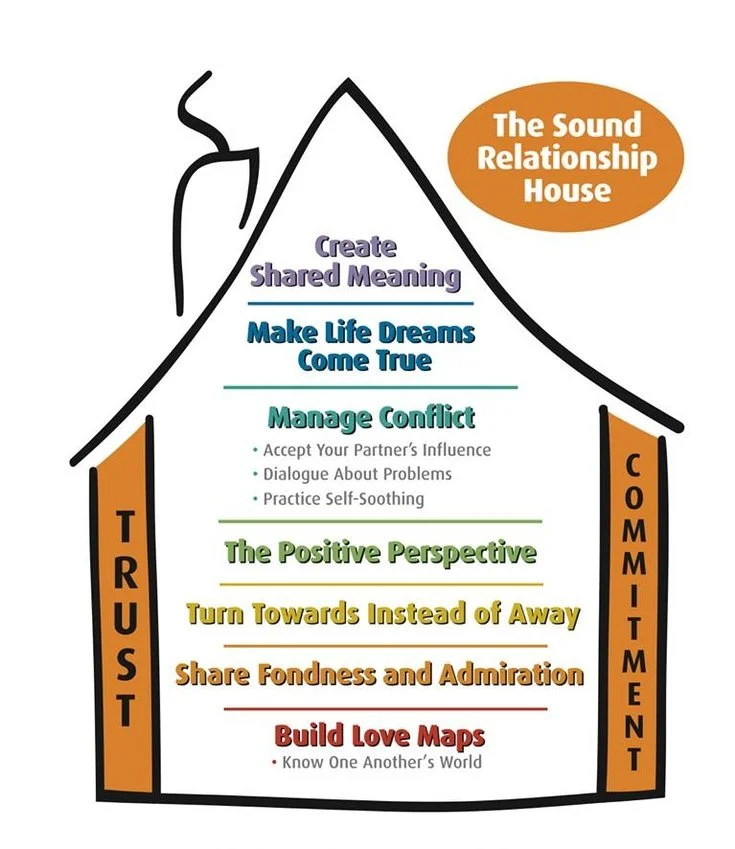
FOUR PILLARS OF CONNECTION
Why Some Couples Grow Closer — and Others Don’t
When couples experience infertility or pregnancy loss, the impact on their relationship can be profound. For some, the shared struggle strengthens their bond; for others, the stress and grief create distance they never anticipated.
The Four Pillars of Connection During Reproductive Grief
Research shows that about 25% of couples report a stronger relationship after navigating reproductive grief, while roughly 30% experience lasting strain.
In Dr. Clay’s study of more than 1,000 couples, four consistent patterns emerged that predicted which relationships stayed connected and which ones struggled.
Take a Deeper Look At
The Four Pillars of Connection
These patterns became the Four Pillars of Connection During Reproductive Grief — a framework for understanding and protecting closeness during one of life’s most difficult seasons:
-
Recognizing, naming, and validating emotions in oneself and one’s partner.
-
Managing heightened conflict and complex decisions without eroding trust.
-
Exploring and understanding disrupted hopes for parenthood.
-
Preserving sexual and emotional closeness when grief disrupts connection.
Pillar 1:
Emotional Responding
Connecting Mindfully Through Emotional Understanding and Responding
Reproductive grief can leave emotions raw and unpredictable. Some days you may feel deeply connected, while on others it can seem like you and your partner are living in separate worlds. One may need to talk, the other to retreat. One may cry, the other go quiet. These differences are common, but without conversation, they can build walls instead of bridges.
Emotional responding — noticing, sharing, and receiving each other’s feelings with care — is a skill that helps keep those bridges open.
-
When partners process and express emotions differently, it’s easy to misunderstand each other or feel alone in the same room (Cote-Arsenault & Mahlmeister, 2015). Learning to connect mindfully in these moments can protect closeness, even when grief is heavy.
Couples who can:
Actively name their emotions in the moment (Domar & Cougle, 2017)
Accept the emotions of their partner without judgment (Casu et al., 2019)
…are far more likely to feel supported and united through the experience.
-
In one of Dr. Clay’s studies (Brigance et al., 2024; n = 961), couples who shared their emotions openly and withheld judgment toward each other’s feelings reported higher relationship satisfaction during reproductive grief.
-
Plutchik's Wheel of Emotions maps eight primary emotions — joy, trust, fear, surprise, sadness, disgust, anger, and anticipation — that can combine into more complex experiences. Actively naming these emotions and accepting each other’s feelings can help couples feel understood and less alone.
For Clinicians
Encourage real-time emotional identification.
Teach validation skills to help partners accept emotions without judgment.
Use tools like Plutchik’s Wheel to support emotional literacy in sessions.
For Couples
Practice naming what you feel in the moment, even if it’s uncomfortable.
When your partner shares an emotion, focus on listening rather than fixing.
Remember: different emotional responses don’t mean disconnection — they can be opportunities to understand each other more deeply.
Pillar 2:
Conflict
Managing Heightened and Decisional Conflict
Grief can make small disagreements feel heavier and important decisions harder to navigate. Even couples with strong communication skills may find themselves clashing more often.
Sometimes the disagreements are about everyday frustrations like missed appointments, finances. Other times they involve life-changing choices — whether to continue treatment, what to do with embryos, or how much to share with others.
-
Reproductive grief often brings two kinds of conflict:
Heightened conflict — Small issues escalate quickly under emotional strain.
Decisional conflict — Complex, high-stakes choices stir deep emotions and differences in perspective.
-
Heightened emotional arousal can impair communication, making defensiveness more likely (Kendall-Tackett, 2005). Decisional conflict often stems from differences in goals, fears, or expectations (Cohen, 2010). Without intentional tools for navigating these moments, trust can wear thin.
-
For Clinicians:
Teach self-regulation skills to help partners pause before reacting (Baumeister et al., 2007).
Use structured dialogue to slow down and foster curiosity instead of defensiveness.
Incorporate Gottman Method conflict-resolution tools.
For Couples:
Take breaks when emotions run high.
Summarize your partner’s view before sharing your own.
Approach disagreements as shared problems to solve together.
Pillar 3:
Dreams of Parenthood
Sharing Disrupted Dreams of Parenthood
For many couples, the dream of parenthood begins long before trying to conceive. You may have pictured first moments, family milestones, and a future that now feels uncertain or lost. When infertility or pregnancy loss alters that vision, it can feel like a part of your identity is missing.
-
Talking about disrupted dreams allows couples to see and understand each other’s grief. Without these conversations, loss can remain unspoken, creating quiet distance.
-
Exploring the why behind each other’s feelings fosters empathy and tailored support (Brown & Taylor, 2020).
In one of Dr. Clay’s studies (Brigance, 2025; Brigance et al., 2024), couples who developed a shared meaning system — a mutual understanding of what their experience meant — were most likely to report feeling closer afterward.
-
For Clinicians
Guide conversations toward the meaning behind disrupted dreams.
Encourage exploration of how loss has shaped identity and expectations.
Use EFT and Gottman Method exercises to help couples feel heard and understood.
For Couples
Speak your disrupted dreams aloud, even when it’s painful.
Listen without trying to solve or change your partner’s feelings.
Recognize that grief will look and feel different for each of you, and both are valid.
Pillar 4:
Sex and Passion
Maintaining Intimacy Through Reproductive Grief
Infertility and pregnancy loss can affect intimacy in ways couples don’t always anticipate. Medical schedules, emotional strain, and grief can make sex feel like a task — or remove it entirely from the relationship for a time.
-
Sexual connection is more than physical — it’s a form of emotional affirmation. When intimacy fades, feelings of rejection, lowered self-worth and emotional distance can follow.
-
Shifts in sexual intimacy during reproductive grief can impact both partners’ sense of closeness and confidence (Hirsch et al., 2023; Palmer & Harlow, 2022). Talking about it openly can prevent a cycle of avoidance and disconnection.
-
For Clinicians:
Normalize changes in sexual patterns during grief.
Help couples discuss intimacy without pressure or expectation.
Suggest alternative ways to nurture closeness and affection.
For Couples:
Talk about how grief has affected your sexual connection.
Explore other forms of physical closeness.
Remember that intimacy can help restore partnership and resilience.






